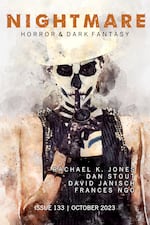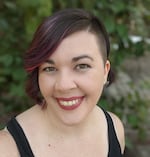Beaverton, Oregon, author Rachael K. Jones’ short story “The Sound of Children Screaming” has been announced as a finalist for the Hugo, Nebula, Bram Stoker and Locus awards.
Inspired by real life events, Jones writes about a grade school teacher and her students who find a portal to a dangerous world while hiding in a closet during a school shooting.
OPB’s Paul Marshall spoke with Jones about the story.

Cover of issue of Nightmare Magazine where "The Sound of Children Screaming" appears.
Nightmare Magazine
Paul Marshall: Can you explain what the three awards are and how a story or book gets nominated?
Rachael K. Jones: The Hugo Award is considered one of the most prestigious awards in science fiction and it’s voted on by the members of World Con (World Science Fiction Convention) which is composed of different publishers, authors and editors. It’s the equivalent of the Oscars and how it works. You have a small community of people who are considered taste makers who vote for the Hugo Awards.
The Bram Stoker Award and the Nebula Award are similar in that they’re both voted on by trade organizations within the writing world. The Nebulas are voted on by the Science Fiction and Fantasy Writers Association members, which are all authors.
The Stoker Award is voted on by the Horror Writers Association which are horror writers. Those are a little more like the Emmys with how they work.
They’re voted on internally by people who are within the industry who are also writers. It’s very rare that you get overlap between the ballots. You end up getting different sorts of preferences by the different communities depending on what they enjoy and like to reward in writing.
I also got nominated for a fourth award called the Locus Award. There’s not a lot of overlap between that ballot and these other three awards.
Marshall: This short story, “The Sound of Children Screaming,” drew inspiration from real life events, including one that involved you. Can you talk more about that?
Jones: It was one of the more scary experiences in my career in education. I’m a speech language pathologist, which is someone who works in special education with children who have communication disorders.
There was a lockdown at my school that happened during prep planning, which is the week before the school opens for children. All the teachers are in the building. We’re getting our classrooms ready and we’re getting the space ready for children. One evening I stayed late to finish building some Ikea furniture. While I was getting ready to leave the building you could hear weird sounds outside the school, little popping sounds.
The secretary called a lockdown of the whole school. It turned out that there was a shooting happening in the neighborhood. I went back and had to hide under my desk in my office with all the blinds drawn on a Friday night. I’m really grateful there weren’t any children in the building, but the most disturbing thing was that, because there were no children in the building, I knew it couldn’t be a drill. I was really scared.
It was one of those moments where we all tell ourselves stories in our own heads about what we would do in an emergency situation. With school shootings, you have a fantasy about how you’re gonna block the door, throw that stapler over there or tackle the guy and how you’re going to be this hero in your imagination. It was this really chilling moment to realize that this could be it. And what am I doing? I’m hiding under my desk and I’m not any more heroic than I usually am. I could die tonight on a Friday night at my job and that would be that, and there would be nothing I could do about it.
A lot of times I use my stories as a way to process strong feelings, I can’t really get out in any other way. For me, the story represents that kind of story where it says the things that are hard for me to say in any other way than fiction.
Marshall: In the story on the other side of the portal, you have mice which include the character Sir Miles and also other mice. What do the mice symbolize to you being on the other side of the gun or other side of the portal?
Jones: I’m definitely of the opinion that readers get to make their own decisions. For me, the mice symbolize two different things.
Anyone who’s familiar with the Narnia books, they’re definitely an allusion to the Narnia story where you’ve got kids who go through a portal and end up in a world that has talking mice and other talking animals. The mice are engaging in all of the things that are markers of gun culture. They’re hunting, all of them carry guns and they go to war.
In terms of the Narnia books, they symbolize Narnia and its gunpowder age. These are mice who are now hunting cats and lions. They’re the kind of mice who have abandoned Aslan, who’s the symbol of all that’s good in Narnia to go do their own thing.
The parallel there is to America. The mice symbolize America and specifically America that’s obsessed with gun culture and when you engage in the kind of gun culture that creates school shootings and the all-pervasive embrace of the gun, then you ban in other things and you become fixated on this one thing and to me that’s what they might symbolize.
Marshall: “The Sound of Children Screaming” - How did you land on that title?
Jones: It came out of the Robb Elementary shooting in Uvalde, Texas. Shortly after that shooting, there was some video released of the police officers inside the school standing around the hallway using hand sanitizer and just hanging out and not really doing anything.
There was a caption that the journalist had put in the video that said “the sound of children screaming has been removed,” which I’m sure was done because at the moment, if I were a family member, I’m not sure I would want to hear that on the news for matters of taste.
It’s stayed with me really powerfully since then. Maybe we need to hear the children screaming because that’s what they all lived through.
I have this thought in my heart that if people actually had to come face to face with what a school shooting really means, maybe that would finally move the needle on stopping them. I gave my story that title both because I wanted to give these children their voices back and because I think that children screaming is really powerful and I wanted them to have that power back.

Author photo of Rachael K. Jones.
Courtesy of Rachael K. Jones
Marshall: You work with school age children. What challenges did you notice when writing for the teacher, Michelle?
Jones: It was really important for me to get her right, because most stories about school shootings tend to focus more on the children. This one is definitely a story about what it means to be an educator.
What I enjoyed most about writing Michelle for this story was just the point of view of being an adult in a fantastic world. When you’re a kid, you kind of get to embrace the whimsy of the talking mice and the castle and all those cool fantastic trappings that are really fun when you’re a kid.
As an adult who works with children, the idea of winding up in that situation is both funny and also just horrifying. I like the idea of having to still be the adult in the room when there’s so many interesting and stimulating things that are going to distract all the children. You then have to find a way to protect them, despite the veneer of friendliness, a kind of Disneyland vibe that maybe the children are perceiving.
Marshall: The theme of power came up, and who holds it. In this case, it was the children. Why was that important for you to distinguish?
Jones: One of the rabbit holes I went down while writing the story was the concept of children’s rights. The U.N. has a charter on children’s rights that details that children should be entitled to things like access to your family, the right to be fed and clothed and attend school.
Nothing will put you in touch with what children’s rights means like working with them directly. I thought a whole lot about what it is we’re trying to do when in the schools as educators while writing this story and the conclusion I came to is that none of us necessarily care about any one lesson.
The point of our public schools is to empower children to be able to make their own decisions in life to whatever degree you can. I work in special education and a lot of the students I serve are often at risk of abuse or for being taken advantage of as adults.
If we don’t prepare them to have as much of their own power as they can — that thread runs through the story and it runs to the conclusion where I think that this teacher has to understand that ultimately, maybe you can’t protect children from all the bad things in life. You can’t control every circumstance, but what you can do is try to give children what power you can back to them. The day is going to come when you will be an adult and no one is going to tell you what to do. I want you to be prepared for that day and to have as happy and healthy a life as possible.
Marshall: How do you think the themes of this story helped to get it nominated for these awards?
Jones: It’s a visceral story. It’s a story that has themes that are uniquely American in some pretty awful ways. I’ve heard a lot of reader feedback over the last few months about the story and mainly I think that it just punches people right in the feelings.
It resonates with some thoughts we all had every single time there is a new school shooting and we have to go through this whole cycle again. A lot of people feel powerless and angry like nothing is ever going to change.
I’m not sure I would call the ending of my story a happy ending. I think that people are resonating with there being a sense of justice at least, people being able to take action when there’s no better choices
Marshall: If you win any or all four of these awards, will that give you a boost in some way?
Jones: I love trophies and I’d be super happy to win any of the awards. I think it would definitely draw some more attention to my career which would be really exciting. It’s just an honor to be nominated, but that’s actually kind of where I am mentally right now, where I’m just really honored that people like my story enough to consider it for their ballots and I’m with some really good company.
Correction: Rachael K. Jones’ name was misspelled in an earlier version of this story. OPB regrets the error.
